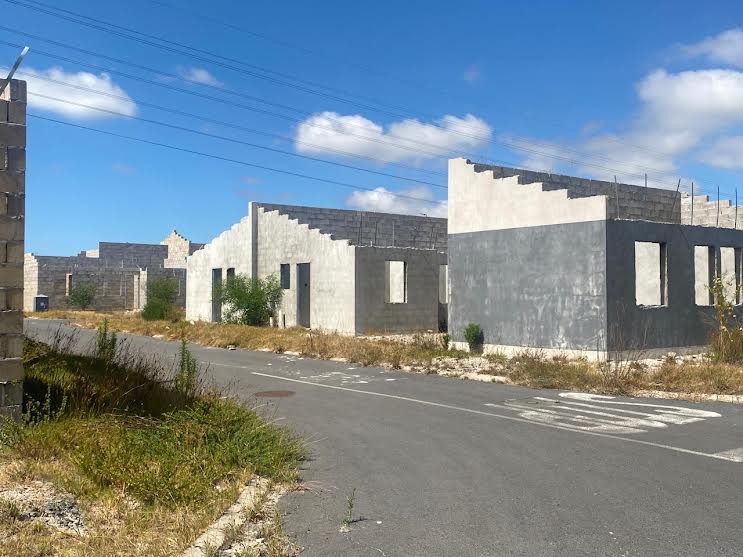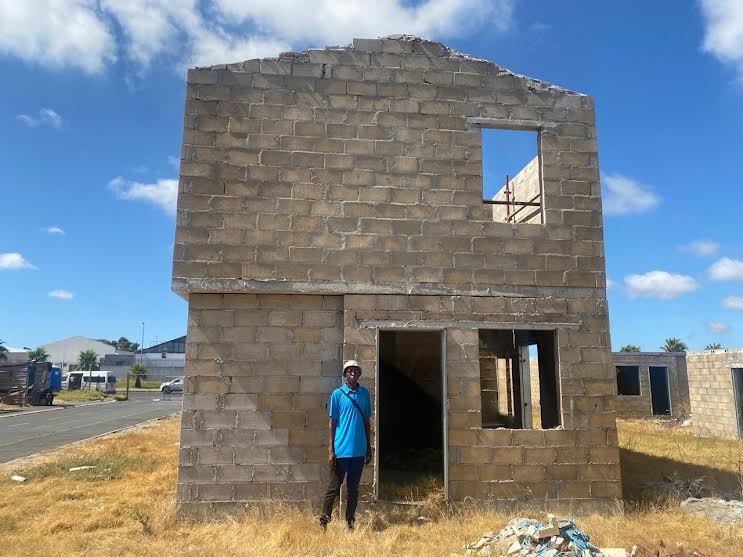Huge Gugulethu housing project dead in the water
Successive failure of construction companies leaves families waiting
Only 23 units out of 570 in the Gugulethu housing project launched in 2018 have been completed. Photo: Siphokazi Vuso
- In 2017, the City of Cape Town allocated R105-million to build 570 RDP housing units in Gugulethu.
- Three companies, Ghika Construction, Simply Do Construction and Masikhule Projects, were appointed in 2018.
- The plan was to complete the project in less than a year.
- But more than five years later, only 23 houses have been completed and handed over.
In 2017, the City of Cape Town set aside R105-million to build more than 570 homes for families who had been evicted under the Group Areas Act and moved to Gugulethu. More than five years later, only 23 houses have been completed.
Three companies, Ghika Construction, Simply Do Construction and Masikhule Projects, were appointed in 2018, to build the units, according to Western Cape Department of Infrastructure spokesperson Jandré Bakker.
The project is known as the “Gugulethu erf 8448 housing project”.
Simply Do started construction in August 2019. Gikha started construction in October 2019. Masikhule started in June 2020.
Construction was expected to take 11 months.
But the project has been bedevilled by the failure of one contractor after another and by the Covid lockdown. Gikha and Simply Do completed no units at all; Masikhule built 27 units but these were incomplete and “several defects and snags were identified”, said Bakker.
Masikhule and Simply Do had ceded their contracts to Boon Africa, which approached the department in July 2023, said Bakker. Boon Africa had committed to complete the 27 units built by Masikhule and to build more units. But by the end of October Boon Africa had failed to meet its commitments, he said.
A new contractor would now be appointed by the City of Cape Town, Bakker said.
Approached by GroundUp, Boon Africa Construction Director Collen Matimba said that the contract had been abruptly terminated before the company could complete the work. He did not say why it had taken so long to build the houses. We could not reach the other companies except for Masikhule who referred us to Boon.
Mayco Member for Human Settlements Carl Pophaim said Ghika Construction and Simply Do Construction had abandoned the site in 2020 and their contracts had been terminated. “The contractors’ major challenge was their limited capacity and ability to effectively execute the works,” he said.
Masikhule Projects remained on the site but when it failed to meet targets its contract was terminated in July last year.
Gugulethu Ward 39 councillor Thembinkosi Mjuza said families were demanding answers.
“The development has been facing challenges since it started.“ He said some beneficiaries had died while waiting for their houses.
Housing beneficiary Sabelo Jele, who has been on the housing waiting list for 30 years, said they were losing hope.
“I submitted my application for a house on 16 August 1993. I have been waiting for 30 years. When the project started we were very hopeful that our lives would change. But all we’ve got are empty promises from the City. “
Sabelo Jele says he is losing hope that his house will ever be finished. Photo: Siphokazi Vuso
Ncedeka Mgwele said her husband Thulani Stokwe died waiting for his home. “It was his dream to move the family into a home that is his own. But because of all the delays, he died before he could see that dream,” she said.
Gugulethu Uprising secretary and community activist Marc Matebe said the City had failed the families. We are calling on the City of Cape Town to ensure that the houses are complete by June, ” he said.
Pophaim said a new contractor would start work on the site this month, with the goal of completing the project within 24 months. The families would be kept informed, he said.
Next: Two people are killed in gang violence in the Western Cape every day
Previous: Judge Makhubele accuses PRASA whistleblowers of lying
Letters
Dear Editor
The City broke ground and commenced with construction in April 2019. The deadline at the time was between 2 and 3 years. The project did not commence in 2017, with a deadline of ‘less than a year’ as mentioned in the article.
The City’s Gugulethu infill housing project was subject to not only contractor challenges but experienced many complexities and delays; such as the Covid-19 lockdown in 2020, the unlawful occupation of partially completed units (on the Maumau site) and vandalism to completed works (especially of the electrical infrastructure).
The Gugulethu infill housing project will also ultimately deliver 1004 housing units to qualifying beneficiaries and their families, and not 570 opportunities at mentioned in the article. The 570 units mentioned in the article relates only to the Gugulethu site, and no mention is made of the Erf 2849 site in Nyanga (Maumau) where 434 opportunities must be constructed. On this site, 131 units were successfully completed and handed over to date despite the complexities of this project. It is therefore not accurate to state that the project has only delivered 23 units to date as that relates only on the Gugulethu site.
The new contractor will be introduced to the Project Engagement Committee soon, before construction commences.
The City will continue to do all it can to provide housing opportunities to those who need it most. Our teams remain dedicated to completing the Gugulethu Infill housing project for the beneficiaries and their families.
In the interim, and in order to protect partially completed units which are at risk of unlawful occupation and vandalism, enhanced security has been deployed to the sites in order to safeguard the beneficiaries’ homes until the new contractor commences with work on site.
© 2024 GroundUp. This article is licensed under a Creative Commons Attribution-NoDerivatives 4.0 International License.
You may republish this article, so long as you credit the authors and GroundUp, and do not change the text. Please include a link back to the original article.
We put an invisible pixel in the article so that we can count traffic to republishers. All analytics tools are solely on our servers. We do not give our logs to any third party. Logs are deleted after two weeks. We do not use any IP address identifying information except to count regional traffic. We are solely interested in counting hits, not tracking users. If you republish, please do not delete the invisible pixel.




